Job Interview
Your Cheat Sheet To Mastering Job Interview Q&A (Download NOW!)
Unlock the secrets to acing job interviews with our essential cheat sheet—discover the key strategies that could change your career trajectory forever!
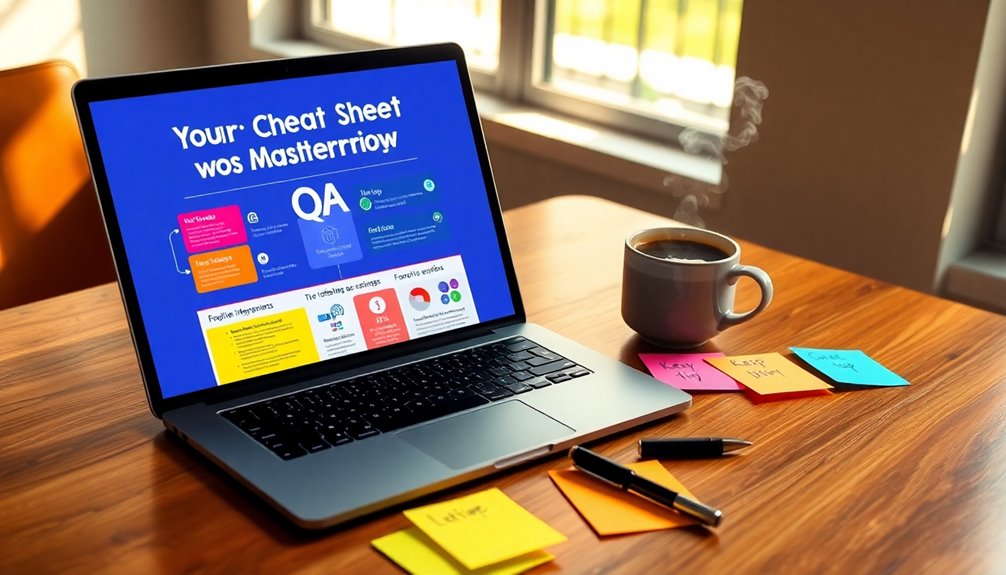
To master job interviews, you need a solid approach. Start by researching the company and analyzing the job description. Prepare specific examples using the STAR method to highlight your skills. Expect common questions about your background and strengths, and practice your responses for clarity. Don't forget body language; maintain eye contact and offer a firm handshake to show confidence. After the interview, follow up with a thank-you note within 24 hours. Incorporating these tips can greatly enhance your performance. Stick around to discover even more insights that can set you apart in your next interview!
Key Takeaways
- Research the company's mission and values to tailor your interview responses effectively.
- Utilize the STAR method to structure answers for behavioral questions clearly.
- Prepare specific examples of past successes that demonstrate relevant skills and qualifications.
- Practice positive body language, including eye contact and a firm handshake, to convey confidence.
- Follow up with a thank-you note within 24 hours to express gratitude and reiterate interest in the role.
Preparing for Success
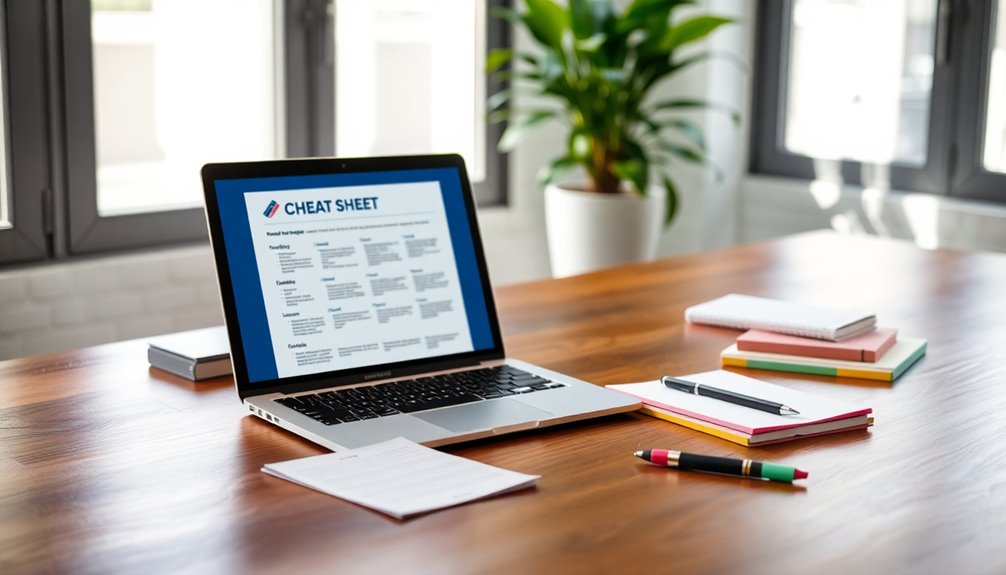
To consistently set yourself up for success in a job interview, thorough preparation is key. Start by researching the company's mission, values, and culture. Understand their products or services, market position, and key competitors. This knowledge will help you articulate why you're a great fit for the role. Additionally, it's essential to demonstrate genuine interest in the organization during the interview, as this can make a positive impression on the interviewer.
Next, dive deep into the job description. Read it carefully to grasp the responsibilities and qualifications required. Identify the key skills and experiences that align with what the employer is seeking. Prepare specific examples demonstrating how you've successfully applied these skills in past roles. This targeted approach gives you a unique edge.
Practicing your answers is equally important. Use techniques like the STAR method to structure your responses. Rehearse answering common questions aloud, possibly with a friend, or even in front of a mirror. This will help you refine your delivery and guarantee your answers are clear and concise.
On the interview day, aim to arrive 10-15 minutes early. Bring multiple copies of your resume and a notebook for notes. Greet the interviewer with a firm handshake and a smile, maintaining eye contact.
This preparation will boost your confidence and set you up for success!
Common Questions to Expect
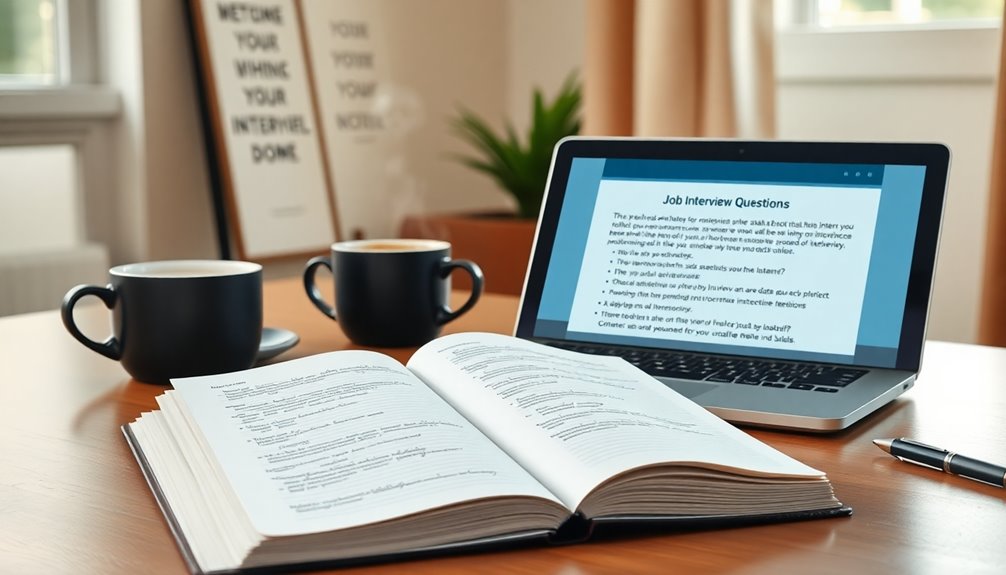
Anticipation can be a powerful ally as you prepare for a job interview, especially when it comes to the questions you might face. Common inquiries often start with your background. Be ready to talk about yourself, your current role, and your key accomplishments.
Employers want to know why you're a fit for their position, so align your skills with their needs. Understanding common interview questions can help you tailor your responses effectively.
You'll likely be asked how you heard about the job and what excites you about it. Demonstrating your knowledge of the company's mission and values can set you apart.
Expect questions about your strengths and weaknesses, too. Highlight your skills and offer specific examples while showing self-awareness in discussing areas for improvement.
Behavioral questions will test how you handle challenges, so prepare to share experiences using the STAR method.
Finally, don't forget to have questions ready for your interviewer. Ask about company culture, role-specific challenges, and opportunities for growth. This shows your genuine interest and helps you assess if it's the right fit for you.
Mastering the STAR Method

Mastering the STAR method can greatly enhance your performance in behavioral interviews. This structured approach—Situation, Task, Action, Result—helps you convey clear and impactful stories from your past experiences.
Start by reviewing the job description to pinpoint relevant skills and challenges, which will guide you in anticipating behavioral questions.
Next, list past experiences that showcase your strengths. Practice your responses, focusing on brevity and clarity. When constructing your STAR answers, keep in mind the breakdown:
- Situation (20%): Briefly set the scene and provide necessary context.
- Task (10%): Clearly outline your objective and role in the scenario.
- Action (60%): This is where you shine! Detail the steps you took, emphasizing skills and decisions made.
- Result (10%): Share the outcomes of your actions, including specific metrics or lessons learned.
Remember to keep your answers concise and relevant. Highlight the impact of your contributions, and guarantee your delivery feels natural. Using the STAR method enhances your communication skills, allowing you to effectively demonstrate your qualifications.
Practicing these structured responses won't only prepare you for the interview but also boost your confidence.
Body Language Tips

Strong body language can greatly influence the impression you make during an interview. Start by making strong eye contact and smiling as you enter the room, conveying warmth and approachability. Offer a firm handshake—this shows confidence without being overly aggressive. Greet everyone with professionalism, from the receptionist to the hiring manager.
While seated, maintain good posture with your shoulders back and spine straight. This posture reflects confidence and engagement. Sit upright, avoiding slouching or leaning back, which can suggest disinterest. Lean slightly forward to show you're invested in the conversation. Remember that good posture conveys confidence and professionalism, setting a positive tone for the interview. Additionally, showing emotional well-being through your demeanor can create a more inviting atmosphere during your interaction.
As you interact, establish and maintain eye contact to demonstrate attentiveness, but remember to blink naturally to avoid an intense stare. Smile appropriately and nod occasionally to signal engagement. Control your hand movements; keep them relaxed at your sides or use them for note-taking. Avoid fidgeting, tapping fingers, or excessive gesturing, which can convey nervousness.
Finally, keep your legs uncrossed and refrain from foot tapping, as this can indicate impatience. Mastering these body language tips will help you create a positive impression and enhance your overall interview performance.
Effective Follow-Up Strategies
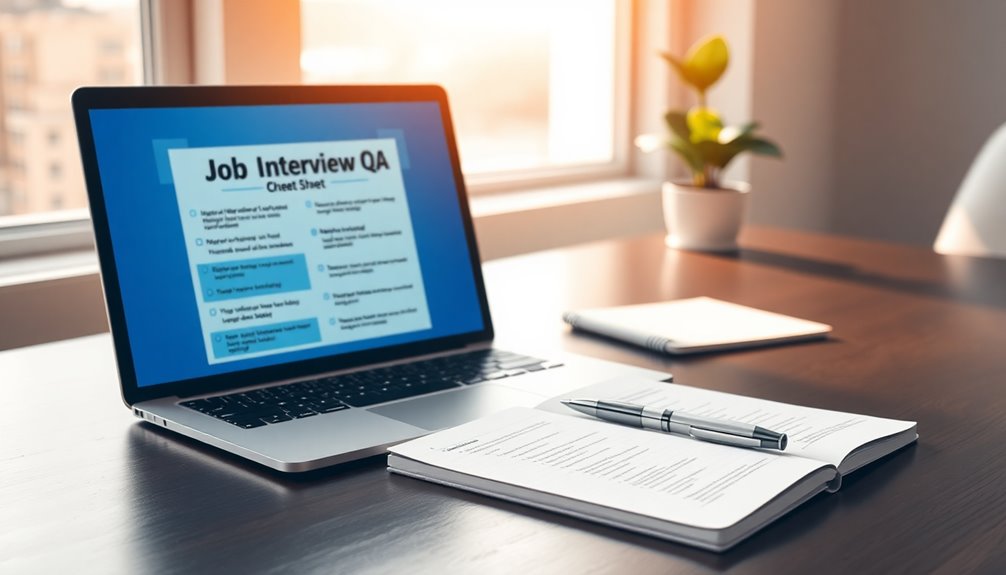
Following up after a job interview is essential for reinforcing your interest and leaving a lasting impression. Aim to send a thank-you note or email within 24 hours, ideally by the end of the day. This guarantees your message is the first thing the interviewer sees the next morning.
If they mentioned they'd be in touch 'next week,' wait about 10 days before checking in.
In your follow-up, start with a clear introduction, mentioning the specific job title and company. Thank the interviewer for their time and reiterate your enthusiasm for the role. Highlight key points from your discussion to jog their memory and briefly mention any qualifications you didn't cover. It's also important to remember that a follow-up call can help manage expectations regarding the hiring process.
Use email for your initial note, as it's formal and easy to track. Make the subject line engaging, like "Thank you for your time today, [Interviewer’s Name]."
If you don't receive a response, consider a phone call, but prepare a script to avoid awkward pauses. Throughout all communications, maintain professionalism, express gratitude, and show continued interest in the position.
If you're not selected, thank them for the opportunity and be open to feedback.
Frequently Asked Questions
How Should I Dress for a Job Interview?
When you're dressing for a job interview, consider the company culture first. Research their dress code and check out their social media for clues.
For casual workplaces, opt for dark jeans or a knee-length dress; for business casual, go for tailored pants and a blouse. Ascertain your outfit is clean, fits well, and allows comfortable movement.
Pay attention to grooming and avoid anything too flashy to keep the focus on you.
What Should I Bring to the Interview?
When you prepare for an interview, bringing the right items can make a big difference.
Start with multiple copies of your resume and cover letter, along with references.
Don't forget a notepad for jotting down notes and questions.
If you're in a creative field, include your portfolio.
Keep a charged phone and a water bottle handy to stay refreshed.
Finally, have proof of identity ready, just in case.
How Long Should My Answers Be?
When answering interview questions, it's essential to tailor your response length. For factual questions, keep it under 30 seconds.
Introductory questions should take 30 to 90 seconds, allowing you to share relevant details.
For behavioral questions, aim for 3 to 4 minutes, using the STAR method to structure your response.
Always practice your answers to guarantee they're polished and adjust based on the interviewer's engagement to maintain their interest.
How Can I Handle Unexpected Questions?
When you face unexpected questions, stay calm and take a deep breath. It's okay to ask the interviewer to repeat or clarify.
Focus on your key message, ensuring your response relates to the job. Use relevant examples to illustrate your points.
If you don't know an answer, be honest and show your willingness to learn. Talk through your thought process to demonstrate your problem-solving skills and how your experiences align with the role.
What if I Don't Have a Specific Example to Share?
If you don't have a specific example to share, use hypothetical scenarios to illustrate your thought process.
Describe how you'd tackle a similar situation and outline the steps you'd take.
Look into past company strategies and analyze their effectiveness, suggesting improvements.
Emphasize your transferable skills, showcasing how they apply to the current role.
Prepare generic examples to adapt on the spot, ensuring you demonstrate key competencies and relevant experiences.
Conclusion
In your journey to job interview success, remember that preparation is key. Practice powerful responses, polish your body language, and perfect your follow-up strategies. With these tools, you'll confidently conquer common questions and stand out from the competition. So, gear up, grab your cheat sheet, and get ready to shine! Your dream job is just a stellar interview away. Stay sharp, stay focused, and seize the spotlight!
Emmeline is the backbone of our content creation team, bringing complex psychological concepts to life with clarity and empathy. As our Expert Writer, she crafts engaging, insightful articles that guide readers through the intricacies of personality assessments and what they reveal about the human condition. Her passion for psychology and personal development shines through in every piece she writes.
Job Interview
Mastering Situational Interview Questions: Expert Insights
Transform your interview skills with expert insights on mastering situational questions—discover the secrets to impress potential employers and elevate your career.

Mastering situational interview questions is essential for demonstrating your problem-solving skills and fit with a company's culture. Use the STAR method to structure your responses: outline the Situation, specify the Task, detail the Action you took, and highlight the Result. Be ready to address mistakes transparently, showing accountability and a plan for resolution. Adaptability is key—show how you tackle new challenges with a proactive mindset. Also, highlight effective conflict resolution techniques, emphasizing open dialogue and active listening. There's plenty more to explore that can refine your skills even further.
Key Takeaways
- Utilize the STAR method to clearly structure responses, making it easier for interviewers to follow your thought process.
- Prepare for various situational questions by reflecting on past experiences that showcase problem-solving and adaptability.
- Focus on demonstrating accountability when discussing mistakes, emphasizing learning and resolution strategies employed.
- Practice active listening during interviews to ensure you understand the questions and respond thoughtfully to each scenario presented.
- Highlight your communication skills by articulating your actions and the positive outcomes they achieved in challenging situations.
Understanding Situational Interview Questions

In today's competitive job market, understanding situational interview questions is essential for any candidate. These questions assess how you handle specific job-related scenarios, giving employers insight into your problem-solving skills, ethical standards, and communication abilities.
When faced with a situational question, you'll reveal your approach to real-world challenges, showcasing your adaptability and integrity. Employers use these questions to predict your future job performance and see if you align with their company culture.
The STAR Method Explained

Mastering the STAR method can greatly enhance your responses to situational interview questions. This structured approach helps you articulate your experiences clearly.
Start with the Situation, where you set the context. Next, explain the Task that needed to be accomplished. Then, detail the Action you took to address the Situation. Finally, share the Result of your actions, focusing on the positive outcome.
This method not only guarantees you answer thoroughly but also allows you to highlight your problem-solving skills and adaptability. By practicing the STAR technique, you'll feel more confident and prepared to tackle any situational question, making a lasting impression on your interviewers.
Implement this strategy, and watch your interview performance improve considerably.
Addressing Mistakes and Quality

Mistakes occasionally happen in any workplace, and how you address them can greatly impact your reputation and effectiveness.
When you spot an error, take immediate accountability. For instance, if you realize you've made a mistake in a project, don't hesitate to correct it. Transparency is key; communicate with your superiors about the issue and outline your plan to resolve it. This honesty not only maintains quality but also shows your commitment to customer satisfaction.
Additionally, learn from these experiences. Reflect on what went wrong and identify steps to prevent similar issues in the future. By demonstrating your ability to handle mistakes constructively, you'll build trust and reinforce your reputation as a responsible team member.
Adapting to New Challenges

Facing new challenges is an inevitable part of any job, and your ability to adapt can set you apart from other candidates. When confronted with unfamiliar tasks or systems, show your willingness to learn and seek help.
For instance, if you're asked to manage a new software program, don't hesitate to reach out to colleagues or utilize available training resources. Demonstrating a proactive approach illustrates your commitment to growth and teamwork. Additionally, leveraging knowledge about energy-efficient heat pumps can enhance your problem-solving skills in various scenarios. Understanding the Coefficient of Performance (COP) can also help you assess the efficiency of new systems you may encounter. Furthermore, recognizing how heat pumps outperform traditional systems can provide you with insights into operational efficiencies that may be beneficial in unfamiliar situations.
In your interview, share specific examples where you successfully navigated unexpected changes—this showcases your flexibility. Remember, adaptability isn't just about handling change; it's about thriving in it. Communicating your adaptability effectively can make a significant impression on potential employers and enhance your chances of success.
Learning From Failures

While it's easy to feel discouraged after a setback, viewing failures as opportunities for growth can transform your approach to challenges.
When you encounter a failure, take a moment to analyze what went wrong. Ask yourself what you could've done differently and how you can apply those lessons moving forward.
For instance, if you missed a deadline, consider implementing better time management strategies or prioritization techniques.
Embrace the discomfort of failure; it's often where the most profound learning occurs. Remember, resilience is key. Each setback helps build your ability to adapt and persevere. Additionally, adopting a mindset of self-acceptance can significantly enhance your ability to navigate challenges and emerge stronger.
Conflict Resolution Techniques

When conflicts arise, addressing them head-on can lead to constructive outcomes and stronger relationships. Start by acknowledging the issue and encouraging open dialogue.
Listen actively to all parties involved; this shows you value their perspectives. Use "I" statements to express your feelings without placing blame, fostering a more collaborative environment.
Focus on finding common ground or shared goals, which can help shift the conversation from confrontation to cooperation.
Brainstorm potential solutions together, ensuring everyone feels heard and included.
Finally, agree on an action plan to prevent similar conflicts in the future. Additionally, incorporating trust-building activities can significantly enhance the relationship dynamics as you work through conflicts together.
Effective Communication Strategies

Resolving conflicts effectively often hinges on strong communication skills. You need to express your thoughts clearly while also being receptive to others.
Here are three effective communication strategies to implement:
- Active Listening: Focus on what the other person is saying without interrupting. This shows respect and helps you understand their perspective fully.
- Empathy: Acknowledge the emotions involved. Validating feelings can diffuse tension and pave the way for a constructive dialogue.
- Clear Expression: Use concise language to articulate your points. Avoid jargon and be direct to prevent misunderstandings.
Promoting Innovation and Collaboration

Innovation thrives in environments where collaboration is encouraged. When you work together with diverse teams, you're more likely to generate creative ideas and solutions.
To promote this, foster open communication and create spaces for brainstorming sessions. Encourage everyone to share their perspectives, as this variety can lead to breakthroughs that one person alone might miss.
Recognize and celebrate team successes to reinforce the value of collaboration. When faced with situational interview questions about innovation, highlight your experiences where teamwork led to significant results.
Show that you're not just a solo performer but someone who thrives in a collective atmosphere. Remember, the best ideas often emerge when individuals unite their strengths to tackle challenges creatively.
Frequently Asked Questions
How Can I Prepare for Unexpected Situational Interview Questions?
To prepare for unexpected situational interview questions, practice thinking on your feet. Reflect on past experiences and identify key challenges you faced.
Use the STAR method to structure your responses: describe the situation, task, action, and result. Keep your answers concise and relevant.
Additionally, stay calm and take a moment to gather your thoughts before answering. This approach helps you demonstrate your problem-solving skills and adaptability in real-time.
What Are Common Mistakes Candidates Make During Situational Interviews?
Steering through a situational interview can feel like walking a tightrope.
Common mistakes candidates make include failing to provide specific examples, giving vague answers, or not using the STAR method properly.
You might also overlook the importance of aligning your responses with the company's values or underestimate the power of storytelling.
How Do I Showcase My Adaptability in Responses?
To showcase your adaptability in responses, focus on specific examples where you successfully adjusted to new challenges.
Describe a situation where you quickly learned a new skill or changed your approach to meet evolving demands.
Highlight your willingness to seek help or resources and share the positive outcomes of those experiences.
Use the STAR method to structure your answer, ensuring clarity and emphasizing how your adaptability aligns with the role you're applying for.
What Role Does Body Language Play in Situational Interviews?
When you step into a situational interview, your body language speaks volumes, much like a well-composed symphony. It conveys confidence, openness, and engagement.
Maintain eye contact to show you're attentive, and use gestures to emphasize points. Lean slightly forward to express interest. Avoid crossing your arms, as it can signal defensiveness.
How Can I Follow up After a Situational Interview?
After a situational interview, you should follow up with a thank-you email within 24 hours.
Express appreciation for the opportunity and briefly mention a key point from your discussion that reinforces your fit for the role.
Keep it concise and professional.
If you haven't heard back within a week or two, feel free to send a polite inquiry about your application status.
This shows your continued interest and enthusiasm for the position.
Conclusion
You've got the tools to shine in your next job interview. Just like a skilled sailor navigates through stormy seas, you can steer through situational questions with confidence and clarity. By mastering the STAR method and embracing challenges, you'll not only highlight your strengths but also show your commitment to growth. Remember, every question is an opportunity to showcase your unique skills and fit for the role. Set sail toward success—your dream job awaits!
Eugene brings a fresh, dynamic voice to our platform as one of our talented Writers. Specializing in research-driven content, he explores the latest findings in psychology and personal growth, translating them into actionable insights for our readers. Eugene’s work is fueled by a curiosity about what makes us tick and a desire to help others unlock their potential.
Job Interview
Your First Interview? Conquer It With These Unexpected Questions!
Get ready to transform your first interview experience with unexpected questions that reveal your true potential—discover how to stand out and impress!
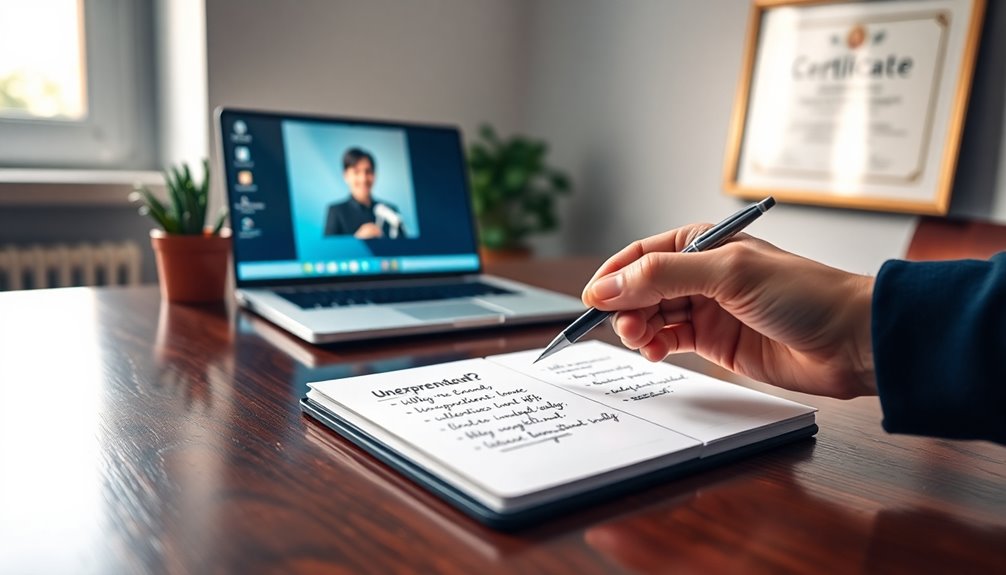
Your first interview can feel intimidating, but using unexpected questions can set you apart. These unique queries reveal your creativity and problem-solving skills while showcasing your fit with the company culture. Think about how you'd handle hypothetical scenarios or innovative challenges. By doing this, you demonstrate adaptability and strong analytical thinking. Remember, how you articulate your responses matters too—reflect on your past experiences to highlight your leadership qualities. Embrace the opportunity to connect your values with the company's mission. There's so much more to explore about impressing in your interview, so keep going!
Key Takeaways
- Prepare for unique questions that assess your problem-solving abilities and cultural fit within the company.
- Practice articulating your thought process during situational challenges to showcase critical thinking.
- Be ready to demonstrate creativity with hypothetical scenarios or innovative uses for everyday items.
- Highlight your emotional intelligence and communication skills to illustrate your ability to work in diverse teams.
- Reflect on past experiences to convey your leadership qualities and adaptability in changing situations.
Importance of Unique Questions

Asking unique questions during an interview not only sparks engaging conversations but also reveals a candidate's true potential. These questions help you demonstrate your problem-solving skills and encourage innovative thinking, setting you apart from other candidates. When faced with unexpected inquiries, you can showcase your adaptability and creativity, essential traits in today's fast-paced work environment.
By exploring your personal values and beliefs through unique questions, interviewers can gauge your cultural fit within the company. This aspect is vital, as it predicts long-term retention and overall job satisfaction. Situational inquiries, for instance, allow you to illustrate your analytical abilities and decision-making processes, giving insight into how you handle real-world challenges.
Moreover, asking unexpected questions helps create memorable conversations. It gives you the chance to reveal your individuality and align your responses with the company's mission and goals. Embracing unique questions not only enriches the interview experience but also positions you as a candidate who thrives on creative thinking and problem-solving. Additionally, demonstrating your understanding of home security system costs can show your preparedness and attention to detail. So, prepare to tackle those unique questions, and you might just conquer your first interview!
Assessing Creativity and Imagination

When you're in an interview, expect questions that test your innovative thinking and creativity. Hypothetical scenarios, like imagining a new crayon color, can showcase your ability to generate original ideas. Reflecting on past creative experiences can also highlight your adaptability and problem-solving skills, making you stand out as a candidate. Additionally, embracing challenges, similar to how STEM toys encourage creativity, can significantly enhance your problem-solving skills in real-world situations.
Gauging Innovative Thinking
Innovative thinking is essential in today's fast-paced job market, and interviews provide a unique opportunity to assess a candidate's creativity and imagination. By asking unconventional questions, you can gauge how well you think outside the box. For instance, consider prompts like "Invisible vs. Flying" to explore your imaginative capabilities. Such questions reveal not just your creativity but also your problem-solving skills in hypothetical scenarios.
Another effective strategy is to ask about the "Creative Uses for a Clip." This encourages you to showcase your adaptability and share past experiences where your ingenuity shone through. Situational questions, such as estimating "Room Capacity," can further demonstrate your analytical thinking while presenting real-world challenges. Engaging in these types of interviews can help you align your responses with the principles of the Law of Attraction, which emphasize the importance of positive thinking in achieving success.
Hypothetical Scenario Challenges
Hypothetical scenario challenges can be a game-changer in interviews, allowing you to showcase your creativity and problem-solving skills. When faced with hypothetical scenario questions, think of them as an opportunity to reveal your personality traits and analytical abilities. Responding thoughtfully can set you apart from other candidates.
Here are some tips to tackle these challenges effectively:
- Stay imaginative: Let your creativity flow by thinking outside the box.
- Be practical: While creativity is key, guarantee your solutions are feasible and realistic.
- Showcase adaptability: Highlight how you can pivot your thinking based on different scenarios.
- Reflect your values: Use your answers to convey what matters most to you.
For example, when asked, "If you could have any superpower, what would it be and why?" consider how your choice reflects your problem-solving skills and personal values. Engaging with these imaginative scenarios allows you to display your thought processes, giving interviewers insight into your unique perspectives. So, don't shy away from these questions; embrace them as a chance to demonstrate your innovative thinking and make a lasting impression.
Past Creative Experiences
Past creative experiences reveal much about your ability to think outside the box and tackle challenges head-on. When interviewers ask about your creative experiences, they're looking for evidence of your innovative thinking and problem-solving skills. For instance, consider a time when you developed a unique solution to a pressing problem. This reflection not only showcases your creativity but also highlights your approach to overcoming obstacles.
Your answers can reveal your values and motivations, offering insight into what you're passionate about. By discussing how you've used creativity in past roles, you demonstrate your potential contributions to team dynamics and whether you'd be a good fit for the company culture.
Moreover, sharing these experiences allows you to articulate your thought processes and communicate complex ideas clearly and effectively. This skill is essential for collaboration in any team setting.
Evaluating Problem-Solving Skills

When it comes to evaluating problem-solving skills, interviewers often present situational challenges that test your analytical thinking. For instance, they might ask you how you would estimate the number of windows in a skyscraper to gauge your critical thinking process. These questions not only reveal your approach to complex issues but also highlight your ability to adapt and respond to unexpected scenarios.
Situational Challenge Examples
Situational challenge questions are a key part of interviews, designed to evaluate your problem-solving skills in real-world scenarios. These questions not only test your analytical thinking but also reveal your adaptability and decision-making strategies. For example, you might encounter:
- Room Capacity Estimation: Here, you'll estimate how many people can fit in a given space, showcasing your logical reasoning.
- Describing Color to a Blind Person: This challenge assesses your creativity and ability to communicate complex ideas clearly.
- Handling a Difficult Team Member: This scenario tests your conflict resolution skills and teamwork, essential for a collaborative work environment.
- Prioritizing Tasks Under Pressure: In this situation, you'll need to demonstrate how you manage time and resources effectively.
These situational challenge questions encourage you to articulate your thought processes, shedding light on your critical thinking abilities. Your responses can indicate how well you might fit within the company culture, especially regarding resilience when facing unexpected problems. So, prepare to showcase your problem-solving skills, and don't shy away from demonstrating your analytical prowess!
Analytical Thinking Indicators
Analytical thinking is an essential skill employers look for during interviews, often revealed through specific indicators that showcase your problem-solving abilities. When faced with unexpected questions, like estimating the number of windows in a building, your ability to think critically and logically comes into play. These analytical thinking indicators help employers assess how you tackle real-world scenarios.
For instance, when asked to explain a complex concept to a non-expert, your response reveals how well you can break down intricate ideas. This showcases both your problem-solving skills and communication abilities. Similarly, hypothetical scenarios, such as encountering a major obstacle in a project, evaluate your decision-making processes and resilience under pressure.
You might also encounter questions about prioritizing tasks, like choosing between two competing priorities. This tests your strategic thinking and adaptability in complex situations. Additionally, demonstrating your ability to tackle challenges creatively mirrors the way color accuracy impacts overall image quality in projectors. By evaluating your answers to these analytical questions, employers gain insight into your thought processes and how you handle challenges. Emphasizing your analytical thinking during the interview can set you apart, demonstrating that you're not just a candidate, but a potential asset to their team.
Understanding Team Dynamics

Your First Interview? Conquer It With These Unexpected Questions!
Understanding Team Dynamics
Team dynamics are the unseen currents that shape how individuals interact within a group. As you prepare for your first interview, understanding these dynamics can help you stand out as a strong team player. Recognizing the roles and behaviors of your potential colleagues can greatly enhance collaboration and overall performance.
To navigate team dynamics effectively, consider these key aspects:
- Effective Communication: Foster trust and encourage open dialogue to resolve conflicts and build relationships.
- Emotional Intelligence: Develop the ability to understand and respond to the emotions of others, enhancing interpersonal connections.
- Diversity: Embrace diverse teams, as varied perspectives can lead to innovative solutions and improved problem-solving capabilities.
- Assessment of Dynamics: Stay aware of underlying issues like power struggles, allowing you to address them proactively. Additionally, being aware of filial responsibility laws can aid in understanding the broader implications of team support, especially in family-oriented work cultures.
Cultural Fit and Values
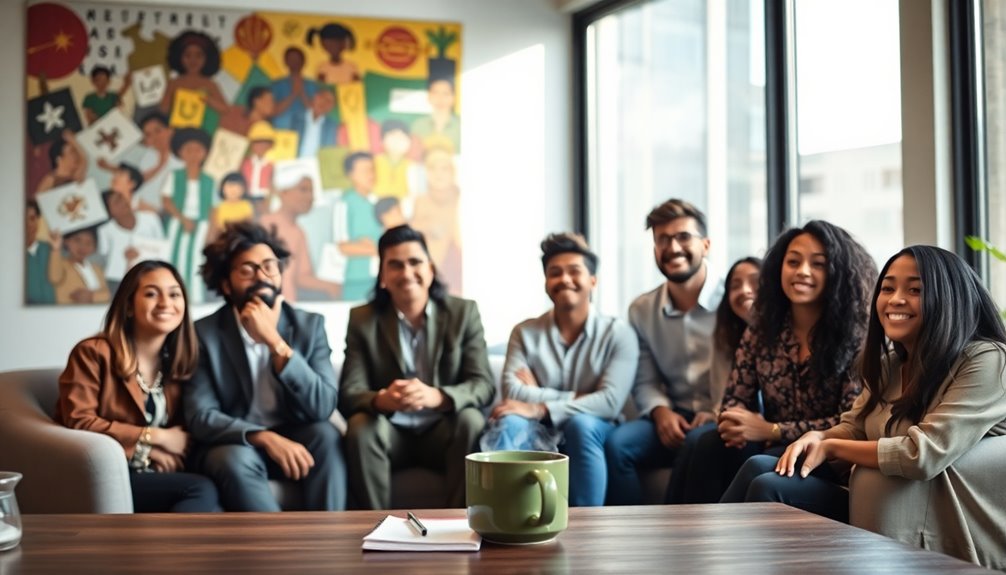
As you prepare for your first interview, recognizing the importance of cultural fit can greatly influence your chances of success. Understanding how your personal beliefs and values align with the company's mission enhances your ability to connect with potential employers. When you reflect on these aspects, you'll be better positioned to discuss how you can positively impact team dynamics and contribute to an inclusive work environment. Additionally, aligning with emotional intelligence can help you navigate interpersonal relationships within the workplace effectively.
To highlight your compatibility, consider these key areas:
| Cultural Aspect | Interview Questions |
|---|---|
| Personal Values | "What are your core values?" |
| Diversity and Inclusion | "Can you share an experience that shaped your views on diversity?" |
| Team Dynamics | "How do you approach collaboration?" |
| Organizational Fit | "What kind of work culture do you thrive in?" |
Adaptability in Challenging Situations

Adaptability is a key skill that can set you apart in an interview, especially when faced with challenging situations. Employers often ask tough interview questions that require you to showcase your adaptability and ability to thrive in unpredictable environments. By sharing your professional experience, you can illustrate your growth mindset and how you've learned from past failures.
Here are some strategies to demonstrate your adaptability:
- Share specific examples: Discuss a time you faced unexpected changes and how you navigated them.
- Emphasize your learning: Highlight what you learned from challenges and how it shaped your approach.
- Show resilience: Explain how you remained calm under pressure and adapted your strategies.
- Connect to the role: Relate your adaptability to the job at hand, showing how it aligns with the company's needs.
- Recognize the importance of clear communication: Being able to express your thoughts and feelings can enhance your adaptability in challenging relationships.
Insights Into Leadership Qualities

Demonstrating adaptability not only showcases your ability to handle challenges but also highlights your potential as a leader. During your interview, expect questions that explore your leadership qualities. Questions like "Describe your leadership style" or "Share a time you inspired a team" offer insights into your approach to guiding others and your capacity to motivate teammates.
Interviewers often value candidates who can reflect on past experiences, particularly in how you've navigated conflict or resolved challenges. When discussing these situations, emphasize your adaptability and the lessons you learned. This helps illustrate your growth mindset, a significant trait for effective leadership.
Additionally, ethical decision-making is essential in today's workplace. Be prepared for questions about your values, like "How do you approach career climbing ethics?" This allows you to demonstrate alignment with the company's values and expectations for future leaders.
Highlighting specific examples of leadership achievements, or even lessons learned from failures, can further showcase your resilience. By framing your responses around these key elements, you position yourself as a strong candidate ready to embrace leadership opportunities within the organization.
Frequently Asked Questions
How Do You Deal With Unexpected Interview Questions?
When you face unexpected interview questions, take a moment to pause and gather your thoughts. This brief silence shows confidence and allows you to formulate a clear response. Think aloud to display your problem-solving skills, and make sure your answers connect back to the role and the company's values. Be honest and authentic; interviewers value self-reflection. Practicing common unexpected questions beforehand can also help you respond creatively and confidently.
How Do You Handle Unexpected Challenges Interview Questions?
When you face unexpected challenges in interviews, stay calm and collected. Use the STAR method to structure your responses, focusing on a specific situation where you successfully navigated a challenge. Clearly outline the task at hand, the actions you took, and the positive results that followed. This approach highlights your adaptability and problem-solving skills, demonstrating to the interviewer that you can handle pressure and learn from experiences. Practice articulating your thought process to enhance your confidence.
How Do You Conquer an Interview?
To conquer an interview, confidently cultivate your creativity and clarity. Start by practicing responses to potential questions and employing the STAR method to structure your answers. Showcase your skills by sharing specific stories that highlight your adaptability and growth. Research the company's culture so you can resonate with their values. Finally, don't forget to engage with thoughtful questions, leaving a lasting impression that'll resonate well with your interviewers. You've got this!
How to Answer Spontaneous Questions in an Interview?
When you face spontaneous questions in an interview, take a moment to collect your thoughts. Use the STAR method to structure your response, ensuring clarity and focus. Think aloud to share your analytical process, which can engage the interviewer and showcase your problem-solving skills. Relate your answers to the company's values and the role itself, demonstrating genuine interest. Practicing unique questions beforehand boosts your confidence and helps you articulate your ideas effectively.
Conclusion
As you commence your interview journey, think of yourself as a ship traversing uncharted waters. Unique questions are the stars guiding you through the night, revealing hidden depths of your creativity and resilience. Embrace each inquiry as a wave that tests your adaptability and reveals your true potential. By showcasing your problem-solving skills and aligning with the company's values, you'll not only reach the shore but also find a treasure trove of opportunities waiting for you.
Felicity, our Author, pens in-depth articles and guides that delve into the heart of personal discovery. Her narrative-driven approach weaves together theory, practice, and personal anecdotes, making the journey of self-exploration both relatable and inspiring. Felicity’s contributions help illuminate the path for those seeking a deeper understanding of themselves and their relationships.
Job Interview
Essential Receptionist Interview Questions Revealed
In this guide, discover essential receptionist interview questions that can make or break your chances, and learn how to prepare effectively for success.

When preparing for a receptionist interview, you should focus on key areas. Expect general questions about your motivation and previous feedback from employers. Be ready to showcase your experience in administrative support or customer service and any relevant software skills. Highlight your client interaction techniques, like how you build rapport and handle challenges. Multitasking and organizational abilities are essential, so mention tools you use to prioritize tasks. Don't forget to discuss your communication skills, as they reflect your professionalism and empathy. Stick around, and you'll uncover even more tips to ace your interview.
Key Takeaways
- Inquire about the candidate's previous employer feedback to gauge their performance and reliability.
- Assess the candidate's motivation for the receptionist role and alignment with company values.
- Explore the candidate's experience in administrative support, customer service, and familiarity with relevant software.
- Evaluate communication skills, focusing on active listening, clarity, and empathy in client interactions.
- Discuss organizational strategies and multitasking abilities, including task prioritization and use of scheduling tools.
General Receptionist Questions

When preparing for a receptionist interview, you'll likely encounter a variety of general questions that help the interviewer assess your fit for the role.
Expect inquiries about your previous employer's description of you, as well as your interest in the company and its values. Be ready to articulate your motivation for pursuing the receptionist position and the key characteristics that define a quality receptionist.
Additionally, they'll want to know about your interest in clerical work and what aspects appeal to you. These questions aren't just to gauge your experience; they help the interviewer understand your personality and how you align with the company culture.
Approach each question thoughtfully, showcasing your enthusiasm and readiness to contribute to the team.
Experience and Qualifications
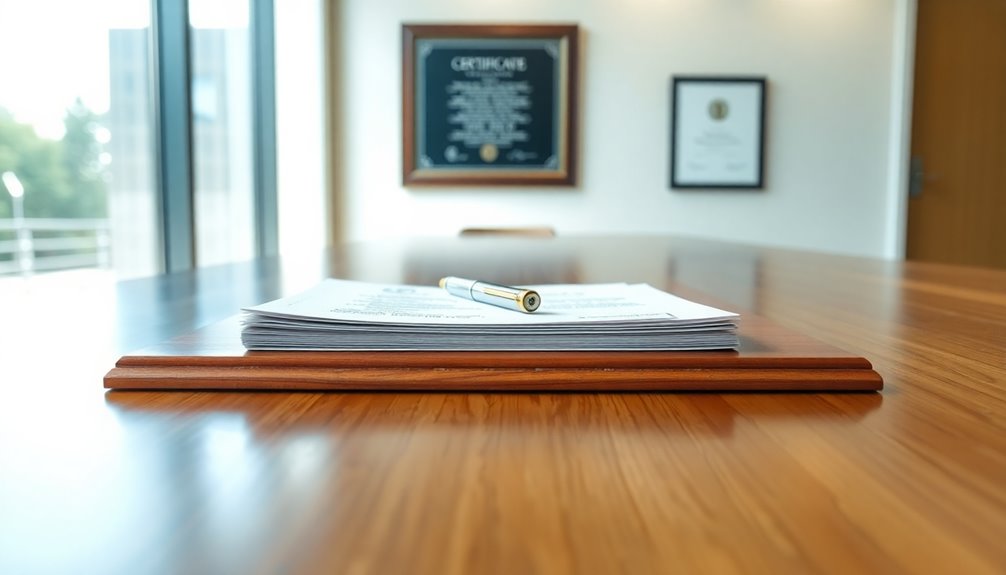
Highlighting your experience and qualifications is essential in a receptionist interview. You should emphasize any relevant background, such as previous roles in administrative support or customer service.
Mention specific software and programs you're familiar with, as this shows your technical capabilities. Be sure to discuss your organizational strategies, demonstrating how you manage tasks effectively in fast-paced environments.
If you have a history of working in diverse settings, share that, too. Your qualifications, whether certifications or courses, can set you apart from other candidates.
Finally, express your enthusiasm for the role and how your skills align with the company's needs. This approach will leave a lasting impression and showcase your readiness for the position. Engaging with effective learning techniques can also enhance your ability to adapt and thrive in the receptionist role.
Client Interaction Techniques

Your ability to interact effectively with clients can greatly enhance their experience and contribute to a positive office atmosphere. Start by greeting each client warmly, making eye contact, and using their name whenever possible. This personal touch builds rapport and shows you value them.
Practice active listening; pay attention to their needs and concerns without interrupting. When responding, use clear and concise language to guarantee they understand.
If a client is upset, remain calm and empathetic, acknowledging their feelings while working toward a solution.
Finally, maintain a professional demeanor, even during challenging interactions. By mastering these client interaction techniques, you'll create an inviting environment that encourages loyalty and satisfaction.
Multitasking and Organization

Effective multitasking and organization are essential skills for a receptionist, especially in a fast-paced environment. You'll often juggle phone calls, greet visitors, and manage schedules simultaneously. To excel, prioritize tasks and use organizational tools, like calendars or task lists, to keep everything on track. Here's a simple table to illustrate some effective strategies:
| Strategy | Description | Benefits |
|---|---|---|
| Prioritize Tasks | Identify urgent vs. non-urgent tasks | Enhances efficiency |
| Use Technology | Utilize software for scheduling | Saves time and reduces errors |
| Color-Coding | Assign colors to different tasks | Improves visibility and organization |
| Regular Check-ins | Review tasks periodically | Guarantees nothing is overlooked |
Stress Management Strategies

Managing stress in a receptionist role is just as important as multitasking and organization. When things get hectic, having effective strategies can help you maintain composure and productivity.
Here are some techniques you can use:
- Prioritize tasks: Identify what's urgent and tackle those items first.
- Take breaks: Step away for a few minutes to recharge your mind.
- Practice deep breathing: Use simple breathing exercises to calm your nerves.
- Stay organized: Keep your workspace tidy to reduce clutter-related stress.
- Seek support: Don't hesitate to ask colleagues for help when needed.
Communication Skills Overview

Strong communication skills are essential for a receptionist, as they serve as the first point of contact for clients and visitors. You need to convey information clearly and professionally, whether it's in-person, on the phone, or via email. Effective communication fosters a welcoming atmosphere and enhances client satisfaction.
Here's a quick overview of key communication traits:
| Skill | Importance | Impact |
|---|---|---|
| Active Listening | Builds trust and rapport | Clients feel valued and understood |
| Clarity | Reduces misunderstandings | Smooth interactions |
| Empathy | Helps in addressing concerns | Clients feel cared for |
| Professionalism | Reflects company values | Positive brand image |
Mastering these skills not only elevates your role but also contributes to a harmonious workplace.
Technology Use in Reception
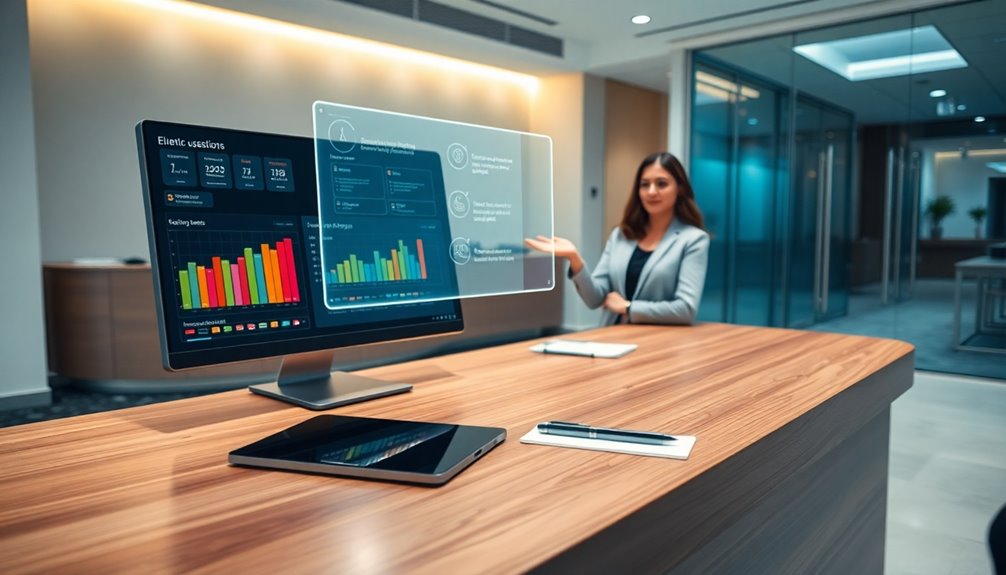
In today's fast-paced office environment, technology plays an essential role in the receptionist's daily tasks. You'll likely be expected to navigate various tools and software efficiently to support operations and enhance client interactions.
Here are some key technologies you should be familiar with:
- Office software: Proficiency in word processing and spreadsheets for reporting and documentation.
- Communication platforms: Familiarity with tools like email, chat, and conferencing apps to connect with colleagues and clients.
- Scheduling software: Using calendars and appointment systems to manage meetings effectively.
- Customer relationship management (CRM): Tracking client interactions and preferences for personalized service.
- Data entry systems: Inputting and managing information with accuracy to maintain organized records.
Embracing these technologies will make your role smoother and more effective.
Teamwork and Collaboration

While you may often be the first point of contact in an office, your role as a receptionist extends beyond individual tasks; it's about fostering teamwork and collaboration among colleagues. By supporting team goals and maintaining open communication, you help create a positive work environment. Here are some strategies to enhance collaboration:
| Strategy | Description | Benefit |
|---|---|---|
| Open Communication | Encourage team members to share ideas openly | Builds trust and respect |
| Conflict Resolution | Address issues calmly and constructively | Maintains team harmony |
| Support Team Goals | Align your tasks with team objectives | Enhances overall productivity |
Establishing clear communication is vital to ensuring that everyone is on the same page and working towards common goals.
Frequently Asked Questions
What Motivates You to Work in a Receptionist Role?
Your motivation to work as a receptionist stems from your love for interacting with people and creating a welcoming environment.
You enjoy being the first point of contact, ensuring clients feel valued and heard.
The dynamic nature of the role excites you, as it allows you to multitask and develop organizational skills.
Plus, you appreciate the opportunity to support a team, contributing to a positive atmosphere in the workplace.
How Do You Ensure Confidentiality in Your Work?
To guarantee confidentiality in your work, you should always handle sensitive information with care.
Use secure methods for storing documents, like locked cabinets or encrypted files.
When discussing client details, do it in private settings to avoid eavesdropping.
Be mindful of your surroundings and limit access to confidential areas.
Additionally, you can regularly update your passwords and stay informed about data protection practices to maintain a secure environment for both clients and colleagues.
What Qualities Make a Receptionist Stand Out?
To stand out as a receptionist, you've gotta demonstrate excellent communication skills and a friendly demeanor.
Your ability to multitask efficiently, while staying organized, is essential. Show your adaptability in handling unexpected situations and a knack for problem-solving.
Being proactive, maintaining confidentiality, and having a genuine interest in helping others can set you apart.
Finally, a positive attitude and a commitment to quality service can truly elevate your role in the office.
Describe a Time You Learned a New Software Quickly
Imagine diving into a pool for the first time; the initial shock quickly turns into excitement.
You faced a similar challenge when you learned a new scheduling software at your last job. With a little curiosity and determination, you explored its features, asking questions when needed.
Within days, you not only mastered it but also trained your colleagues, showcasing your adaptability and enthusiasm to embrace new tools in a fast-paced environment.
How Do You Handle Difficult Feedback From Supervisors?
When you receive difficult feedback from supervisors, stay calm and listen carefully.
It's essential to understand their perspective. Acknowledge their concerns and ask clarifying questions if needed.
Reflect on the feedback and identify areas for improvement. Instead of taking it personally, view it as an opportunity to grow.
Afterward, implement the suggested changes and follow up to show your commitment to improvement.
This proactive approach can strengthen your professional relationship.
Conclusion
To summarize, preparing for your receptionist interview can greatly boost your confidence and performance. Did you know that 70% of employers value a candidate's soft skills, like communication and organization, just as much as their technical abilities? By anticipating common questions and crafting thoughtful responses, you'll not only showcase your qualifications but also make a lasting impression. Approach the interview with enthusiasm, and you'll be well on your way to landing the role you desire!
Eugene brings a fresh, dynamic voice to our platform as one of our talented Writers. Specializing in research-driven content, he explores the latest findings in psychology and personal growth, translating them into actionable insights for our readers. Eugene’s work is fueled by a curiosity about what makes us tick and a desire to help others unlock their potential.
-

 Love Compatibility between Zodiac Signs1 month ago
Love Compatibility between Zodiac Signs1 month agoRat Compatibility in the Chinese Zodiac: Which Signs Are the Perfect Match?
-

 Love Compatibility between Zodiac Signs2 months ago
Love Compatibility between Zodiac Signs2 months agoThe Ultimate Guide to Throuple Zodiac Compatibility
-

 Love Compatibility between Zodiac Signs2 months ago
Love Compatibility between Zodiac Signs2 months ago10 Mother-Daughter Zodiac Combinations That Have Natural Compatibility
-

 Love Compatibility between Zodiac Signs2 months ago
Love Compatibility between Zodiac Signs2 months agoHow to Assess Snake Compatibility in the Chinese Zodiac
-

 Love Compatibility between Zodiac Signs4 weeks ago
Love Compatibility between Zodiac Signs4 weeks agoCat Zodiac Compatibility: Which Signs Are Most Compatible With Cats?
-

 Love Compatibility between Zodiac Signs3 months ago
Love Compatibility between Zodiac Signs3 months agoBTS Zodiac Signs Compatibility: A Guide to Their Ideal Matches
-

 Love Compatibility between Zodiac Signs3 weeks ago
Love Compatibility between Zodiac Signs3 weeks agoDiscover Your Family's Zodiac Compatibility With This Calculator
-

 Childfree3 months ago
Childfree3 months ago10 Reasons Why Being Childfree Is Empowering





















